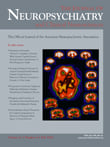Baclofen Withdrawal Causes Psychosis in Otherwise Unclouded Consciousness
To the Editor: Baclofen is a well known GABA B receptor agonist, and intrathecal baclofen therapy is increasingly used to treat medically intractable spasticity. 1 In recent studies of rodent models, activation of GABA B receptors with baclofen was reported to reverse sensory gating deficits, a known endophenotype of psychosis. 2 There needs to be a greater awareness of the dangers of baclofen toxicity and withdrawal, including its neuropsychiatric effects. 1 Here we report an unusual case of repeated exposure to baclofen toxicity and a subsequent withdrawal state resulting in the emergence of frank psychotic symptomatology without concomitant clouding of consciousness and with retained attention and orientation.
Case Report
A 45-year-old patient suffering from progressive spastic quadriparesis of unknown origin went from a comatose state to a fulminant psychotic episode following elective insertion of an intrathecal baclofen pump. She was on oral baclofen, with no previous psychiatric diagnosis or other relevant medical history. Inadvertently, a 20 times higher than usual daily dose of baclofen was given via pump, as a result of which she became progressively drowsy and unresponsive (Glasgow Coma Scale=3). The pump was promptly stopped, and within 24 hours she regained consciousness and stabilized, but developed vivid visual, auditory, and tactile hallucinations. She was found to experience intensive feelings of derealization and depersonalization and appeared to have developed a complex paranoid delusional system. On assessment she also reported Schneiderian first-rank symptoms, but, interestingly, otherwise appeared cognitively intact, fully orientated throughout, and with retained attention. A withdrawal reaction was diagnosed and baclofen reintroduced. Although the patient’s mental state improved following the reestablishment of baclofen, the elaborate delusional ideation and feelings of depersonalization continued, prompting introduction of risperidone, 1 mg at night. Over the following days further improvement was noted, and eventually risperidone was stopped. Once discharged, the patient was followed in the psychiatric outpatient clinic where she continued to report some altered perceptions and paranoid overvalued ideation, but no frank psychotic symptoms during the next few months.
Comment
The pathophysiology of the effect of baclofen in humans in producing psychotic symptoms during withdrawal states, such as were present in our patient, is as of yet unclear and warrants further investigation. 1 Interestingly, Leo and Baer 3 recently suggested that delirium rather than psychiatric symptoms consistent with a psychiatric disorder, or an exacerbation of a preexisting psychiatric illness, was the result of the withdrawal. In their review of all reported cases in the literature so far, a fluctuation of consciousness, inattention, memory impairments, and/or perceptual disturbances emerged abruptly in association with the withdrawal of baclofen. Moreover, the psychiatric symptoms were reported to emerge in the context of disturbed physical parameters, including tachycardia, autonomic changes, seizures, and spasticity. 3 This is in clear contrast to our case where an unambiguous set of psychiatric symptoms developed in the background of unclouded consciousness, retained attention, intact cognition and without disturbed autonomic parameters and hence forfeited the syndromal diagnosis of delirium.
1. Greenberg MI, Hendrickson RG: Baclofen withdrawal following removal of an intrathecal baclofen pump despite oral baclofen replacement. Clin Toxicology 2003; 41:83–85Google Scholar
2. Bortolato M, Frau R, Orrù M, et al: Activation of gaba (B) receptors reverses spontaneous gating deficits in juvenile DBA/2J mice. Psychopharmacology 2007; 194:361–369Google Scholar
3. Leo RJ, Baer D: Delirium associated with baclofen withdrawal: a review of common presentations and management strategies. Psychosomatics 2005; 46:503–507Google Scholar



